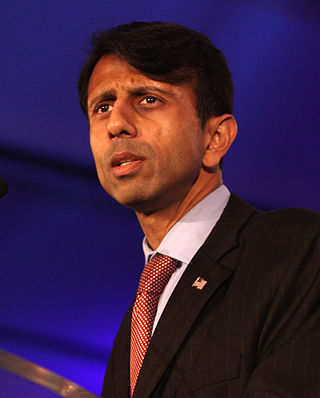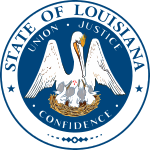
The 1952 Louisiana gubernatorial election was held in two rounds on January 15 and February 19, 1952. Like most Southern states between the Reconstruction Era and the Civil Rights Movement, Louisiana's Republican Party was virtually nonexistent in terms of electoral support.

The 1964 Louisiana gubernatorial election was held on March 3, 1964. Democrat John McKeithen won a highly-competitive primary and dispatched Republican Charlton Lyons in the general election, though Lyons made a historically good showing for a Louisiana Republican up to this point.

The 1960 Louisiana gubernatorial election was held on April 19, 1960.

The 1968 Louisiana gubernatorial election was held on February 4, 1968. Incumbent Democratic Governor John McKeithen was re-elected to a second term in office. This was the first election in which the Governor was eligible for re-election to a second consecutive term, following a 1966 constitutional referendum. It was also the first election after passage of the Voting Rights Act of 1965, which brought thousands of African Americans into the electorate for the first time.

The 1995 Louisiana gubernatorial election was held on November 18, 1995, to elect the governor of Louisiana.

United States gubernatorial elections were held in four states. Kentucky and Mississippi held their general elections on November 4. Louisiana held the first round of its jungle primary on October 4 and the runoff on November 15. In addition, California held a recall election on October 7.

The 1983 Louisiana gubernatorial election was held to elect the Governor of Louisiana. Incumbent Republican Governor Dave Treen lost re-election to a second term, defeated by former Democratic Governor Edwin Edwards. Edwards became the first governor since Earl Long to win non-consecutive terms. He also became the first to serve three full terms.

The 1936 Louisiana gubernatorial election was held on January 21, 1936. Like most Southern states between the Reconstruction Era and the Civil Rights Movement, Louisiana's Republican Party was virtually nonexistent in terms of electoral support. This meant that the Democratic Party primary held on this date was the real contest over who would be governor. The election resulted in the victory of Richard W. Leche of New Orleans as governor. Leche was supported by the Longite faction of the party and Cleveland Dear of Alexandria by the anti-Longs' "Home Rule" ticket. State Representative Mason Spencer of Tallulah dropped out of the race and endorsed Dear, but the ballots had already been printed, and he received nearly two thousand votes.

The 1920 Louisiana gubernatorial election was held on April 20, 1920. Like most Southern states between the Reconstruction Era and the Civil Rights Movement, Louisiana's Republican Party had virtually no electoral support. This meant that the Democratic Party primary held on January 20 was the real contest over who would be governor. The election resulted in the election of John M. Parker as governor of Louisiana.

The political balance in Louisiana was heavily affected by the post-Hurricane Katrina departure from New Orleans. Heavily Democratic New Orleans lost some 1/3 of its population. The overall effect reduced the Democrats' base of support in the state and turned Louisiana into a Republican-leaning state thereafter. New Orleans remained Democratic, electing Mitch Landrieu as mayor in February 2010. In the 2008 elections, Louisiana sent a mixed result, with the election of U.S. Senator John McCain for President and the reelection of Democratic U.S. Senator Mary Landrieu. The other senator, at the time, was Republican David Vitter.

The 2011 Louisiana gubernatorial election was held on October 22 with 10 candidates competing in a nonpartisan blanket primary. Incumbent Republican Bobby Jindal was elected to a second term as governor of Louisiana. Since he received an outright majority of the vote in the blanket primary, a runoff election that would have occurred on November 19 was unnecessary. As of 2023, this is the last time a Republican was elected Governor of Louisiana and the last time the winning candidate won every single parish in a statewide election. This is also the last time there was no runoff election for Governor of Louisiana.

United States gubernatorial elections were held in four states in October and November 2011, with regularly scheduled elections in Kentucky, Mississippi, and Louisiana; and a special election in West Virginia. None of these four governorships changed party hands, with Democratic incumbents Steve Beshear and Earl Ray Tomblin winning in Kentucky and West Virginia, respectively; and Republicans re-electing Bobby Jindal in Louisiana and holding the open seat in Mississippi.

United States gubernatorial elections were held in three states in 2015 as part of the 2015 United States elections. In Kentucky and Mississippi, the elections were held on November 3, and in Louisiana, as no candidate received a majority of votes at the primary election on October 24, 2015, a runoff election was held on November 21. The last regular gubernatorial elections for all three states were in 2011. Democrats picked up the open seat of term-limited Republican Bobby Jindal in Louisiana, while Republicans re-elected incumbent Phil Bryant in Mississippi and picked up the seat of term-limited Democrat Steve Beshear in Kentucky.

The 1916 Louisiana gubernatorial election was held on April 18, 1916. Like most Southern states between the Reconstruction Era and the Civil Rights Movement, Louisiana's Republican Party was virtually nonexistent in terms of electoral support. This meant that the Democratic Party primary held on January 25 was supposed to be the real contest over who would be governor. However, in this particular election Progressive Party nominee John M. Parker ran an unusually competitive campaign, garnering 37% of the general election vote. The election resulted in the election of Democrat Ruffin G. Pleasant as governor of Louisiana.

The 1908 Louisiana gubernatorial election was held on April 21, 1908. Like most Southern states between Reconstruction and the civil rights era, Louisiana's Republican Party had minimal electoral support because of the mass disenfranchisement of African Americans. This meant that the Democratic Party primary held on January 28 was the most important contest to determine who would be governor. This election marked the first time Louisiana used primaries to nominate party nominees. Republicans nominated Henry Newton Pharr, son of the party's 1896 nominee, John Newton Pharr. The election resulted in the election of Democrat Jared Y. Sanders Sr. as governor of Louisiana.

United States gubernatorial elections were held on November 5, 2019, in Kentucky and Mississippi, and November 16, 2019, in Louisiana. These elections formed part of the 2019 United States elections. The last regular gubernatorial elections for all three states were in 2015. The Democrats had to defend an incumbent in Louisiana, while the Republicans had to defend an incumbent in Kentucky plus an open seat in Mississippi. Though all three seats up were in typically Republican states, the election cycle became unexpectedly competitive: Kentucky and Louisiana were seen as highly contested races; and Mississippi's race ultimately became closer than usual, despite being seen as favorable for the Republicans.

The 2021 United States elections were held in large part on Tuesday, November 2, 2021. This off-year election included the regular gubernatorial elections in New Jersey and Virginia. In addition, state legislative elections were held for the New Jersey Legislature and Virginia House of Delegates, along with numerous state legislative special elections, citizen initiatives, mayoral races, and a variety of other local elections. Six special elections to the United States House of Representatives also took place on November 2 or earlier as a result of either deaths or vacancies. The first of these was held on March 20.

United States gubernatorial elections were held in 1935, in three states. Kentucky, Louisiana and Mississippi hold their gubernatorial elections in odd numbered years, every 4 years, preceding the United States presidential election year.

United States gubernatorial elections were held in 1931, in four states. Kentucky, Louisiana and Mississippi hold their gubernatorial elections in odd numbered years, every 4 years, preceding the United States presidential election year. New Jersey at this time held gubernatorial elections every 3 years, which it would abandon in 1949.

United States gubernatorial elections are scheduled to be held on November 7, 2023, in the states of Kentucky, Louisiana, and Mississippi. In addition, special elections may take place if other gubernatorial seats are vacated. These elections form part of the 2023 United States elections. The last regular gubernatorial elections for all three states were in 2019.



















